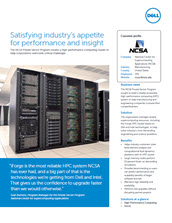
When the National Center for Supercomputing Applications (NCSA) was created at the University of Illinois 27 years ago, it had a unique proposition—its computing, data and networking
resources were designed for industry as well as academia. Over the years, NCSA’s efforts to serve industry have grown and matured.
“NCSA began on a platform of science and industry,” says Merle Giles, the director of private sector programs and economic impact at NCSA. “That was our legacy, and we pushed it even further to create the Private Sector Program.” Through its Private Sector Program (PSP), NCSA has provided supercomputing, consulting, research, prototyping and development, and production services to more than one-third of the Fortune 50, in manufacturing, oil and gas, finance, retail/wholesale, bio/medical, life sciences, technology and other sectors. “We’re not the typical university
supercomputer center, and PSP isn’t a typical group,” Giles says. “Our focus is on helping companies leverage highperformance computing in ways that make them more competitive.” Over time, PSP customers have become increasingly interested in using HPC to solve more of their most critical business problems. Very few companies, however, possess a full complement of HPC systems and expertise. “The return on investment from HPC is something every company struggles with in one way or another,” says Evan Burness, program manager for the PSP. “The key is to demonstrate the ROI of HPC across all phases of a product design cycle.” But not many supercomputing centers are organized and funded well enough to do so. “If you look at the history of
government-funded open science supercomputing, it’s very much focused on basic research,” says Burness. “That can limit the kind of work that industry can do with a place like NCSA.”
Eventually, the Private Sector Program decided it needed to have its own supercomputer. “We needed an HPC system built purely around the interests, challenges, requirements and desires
of industry,” Burness says. “That was going to be the only way we could appropriately serve this community.” As it began the design process, the PSP knew that reliability would be a key factor.
Error: Contact form not found.
All information that you supply is protected by our privacy policy. By submitting your information you agree to our Terms of Use.
* All fields required.




